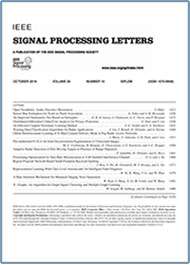- Our Story
- Publications & Resources
- Publications & Resources
- Publications
- IEEE Signal Processing Magazine
- IEEE Journal of Selected Topics in Signal Processing
- IEEE Signal Processing Letters
- IEEE Transactions on Computational Imaging
- IEEE Transactions on Image Processing
- IEEE Transactions on Information Forensics and Security
- IEEE Transactions on Multimedia
- IEEE Transactions on Signal and Information Processing over Networks
- IEEE Transactions on Signal Processing
- IEEE TCI
- IEEE TSIPN
- Data & Challenges
- Submit Manuscript
- Guidelines
- Information for Authors
- Special Issue Deadlines
- Overview Articles
- Top Accessed Articles
- SPS Newsletter
- SigPort
- SPS Resource Center
- Publications FAQ
- Blog
- News
- Dataset Papers
- Conferences & Events
- Community & Involvement
- Professional Development
- For Volunteers
- Information for Authors-OJSP
-
Home
Conferences Events IEEE Signal Processing Magazine IEEE SPL Article IEEE TIFS Article IEEE TMM Article IEEE TSP Article Jobs in Signal Processing Lectures Machine Learning Seasonal Schools Signal Processing News SPM Article SPS Distinguished Lectures SPS Newsletter Article SPS Webinar SPS Webinars SPS Webinar Series Webinar webinars
-
Our Story
What is Signal Processing?

The technology we use, and even rely on, in our everyday lives –computers, radios, video, cell phones – is enabled by signal processing. Learn More » -
Publications & Resources
-
SPS Resources
- Signal Processing Magazine The premier publication of the society.
- SPS Newsletter Monthly updates in Signal Processing
- SPS Resource Center Online library of tutorials, lectures, and presentations.
- SigPort Online repository for reports, papers, and more.
- SPS Feed The latest news, events, and more from the world of Signal Processing.
-
SPS Resources
-
Conferences & Events
-
Community & Involvement
-
Membership
- Join SPS The IEEE Signal Processing Magazine, Conference, Discounts, Awards, Collaborations, and more!
- Chapter Locator Find your local chapter and connect with fellow industry professionals, academics and students
- Women in Signal Processing Networking and engagement opportunities for women across signal processing disciplines
- Students Scholarships, conference discounts, travel grants, SP Cup, VIP Cup, 5-MICC
- Young Professionals Career development opportunities, networking
- Get Involved
-
Technical Committees
- Applied Signal Processing Systems
- Audio and Acoustic Signal Processing
- Bio Imaging and Signal Processing
- Computational Imaging
- Image Video and Multidimensional Signal Processing
- Information Forensics and Security
- Machine Learning for Signal Processing
- Multimedia Signal Processing
- Sensor Array and Multichannel
- Signal Processing for Communication and Networking
- Signal Processing Theory and Methods
- Speech and Language Processing
- Technical Working Groups
- More TC Resources
-
Membership
-
Professional Development
-
Professional Development
- Signal Processing Mentorship Academy (SigMA) Program
- Micro Mentoring Experience Program (MiME)
- Distinguished Lecturer Program
- Distinguished Lecturers
- Distinguished Lecturer Nominations
- Past Lecturers
- Distinguished Industry Speaker Program
- Distinguished Industry Speakers
- Distinguished Industry Speaker Nominations
- Industry Resources
- IEEE Training Materials
- Jobs in Signal Processing: IEEE Job Site
-
Career Resources
- SPS Education Program Educational content in signal processing and related fields.
- Distinguished Lecturer Program Chapters have access to educators and authors in the fields of Signal Processing
- Job Opportunities Signal Processing and Technical Committee specific job opportunities
- Job Submission Form Employers may submit opportunities in the area of Signal Processing.
-
Professional Development
-
For Volunteers
-
For Board & Committee Members
- Board Agenda/Minutes* Agendas, minutes and supporting documentation for Board and Committee Members
- SPS Directory* Directory of volunteers, society and division directory for Board and Committee Members.
- Membership Development Reports* Insight into the Society’s month-over-month and year-over-year growths and declines for Board and Committee Members
-
For Board & Committee Members
Popular Pages
Today's:
- Information for Authors
- (ASRU 2025) 2025 IEEE Automatic Speech Recognition and Understanding Workshop
- IEEE Transactions on Information Forensics and Security
- IEEE Transactions on Multimedia
- Information for Authors OJSP
- Publications & Resources
- Governance Documents
- 2025 Picture Coding Symposium (PCS)
- SPS BSI Webinar: Integration of Brain Imaging and Genomics with Interpretable Multimodal Collaborative Learning
- Inside Signal Processing Newsletter
- Women in Signal Processing
- Board of Governors
- (SPAWC 2026) IEEE 27th International Workshop on Signal Processing and Artificial Intelligence for Wireless Communications
- IEEE Signal Processing Letters
- Editorial Board
All time:
- Information for Authors
- Submit a Manuscript
- IEEE Transactions on Image Processing
- IEEE Transactions on Information Forensics and Security
- IEEE Transactions on Multimedia
- IEEE Transactions on Audio, Speech and Language Processing
- IEEE Signal Processing Letters
- IEEE Transactions on Signal Processing
- Conferences & Events
- IEEE Journal of Selected Topics in Signal Processing
- Information for Authors-SPL
- Conference Call for Papers
- Signal Processing 101
- IEEE Signal Processing Magazine
- Guidelines
Last viewed:
- Teaching Digital Signal Processing by Partial Flipping, Active Learning, and Visualization: Keeping Students Engaged With Blended Teaching
- IEEE Transactions on Multimedia
- Automated FDK-Filter Selection for Cone-Beam CT in Research Environments
- Charbonnier Quasi Hyperbolic Momentum Spline Based Incremental Strategy for Nonlinear Distributed Active Noise Control
- Information for Authors
- Information for Authors OJSP
- Login Error
- Adversarial Robust Modulation Recognition Guided by Attention Mechanisms
- IEEE Open Journal of Signal Processing
- Henry Arguello won ICIP 2022 best paper award!
- Overview Articles
- IEEE Transactions on Image Processing
- IEEE Fellows Program
- IEEE SPM Special Issue on Artificial Intelligence for Education: A Signal Processing Perspective
- SPS Scholarship Program
Perceiving Temporal Environment for Correlation Filters in Real-Time UAV Tracking
You are here
Publications & Resources
Signal Processing Letters
For Authors
Top Reasons to Join SPS Today!
1. IEEE Signal Processing Magazine
2. Signal Processing Digital Library*
3. Inside Signal Processing Newsletter
4. SPS Resource Center
5. Career advancement & recognition
6. Discounts on conferences and publications
7. Professional networking
8. Communities for students, young professionals, and women
9. Volunteer opportunities
10. Coming soon! PDH/CEU credits
Click here to learn more.
Perceiving Temporal Environment for Correlation Filters in Real-Time UAV Tracking
Discriminative correlation filter (DCF)-based methods applied for UAV object tracking have received widespread attention due to their high efficiency. However, these methods are usually troubled by the boundary effect. Besides, the violent environment variations severely confuse trackers that neglect temporal environmental changes among consecutive frames, leading to unwanted tracking drift. In this letter, we propose a novel DCF-based tracking method to promote the insensitivity of the tracker under uncertain environmental changes. Specifically, a regularization term is proposed to learn the environment residual between two adjacent frames, which can enhance the discrimination and insensitivity of the filter in fickle tracking scenarios. Further, we design an efficient strategy to acquire the environment information based on the current observation without additional computation. Exhausted experiments are conducted on two well-known UAV benchmarks, i.e. , UAV123_10fps and DTB70. Results verify that the proposed tracker has comparable performance with other 22 state-of-the-art trackers while running at
As One of the most vital members in the visual system of the unmanned aerial vehicle (UAV), visual tracking has attracted increasing research interest [1]–[2][3] in recent years. Its task is to estimate the target position in subsequent videos under the condition that the ground truth in the first frame is known. Discriminative correlation filter (DCF)-based trackers [1]–[2][3][4][5][6][7], especially with handcrafted features [3]–[4][5][6], have been active in UAV tracking community on account of their high efficiency on a single CPU. However, UAV-specific issues, e.g., fast object motion, camera viewpoint change, and limited resources, require the tracker to possess high performance as well as low energy loss.
SPS Social Media
- IEEE SPS Facebook Page https://www.facebook.com/ieeeSPS
- IEEE SPS X Page https://x.com/IEEEsps
- IEEE SPS Instagram Page https://www.instagram.com/ieeesps/?hl=en
- IEEE SPS LinkedIn Page https://www.linkedin.com/company/ieeesps/
- IEEE SPS YouTube Channel https://www.youtube.com/ieeeSPS
Home | Sitemap | Contact | Accessibility | Nondiscrimination Policy | IEEE Ethics Reporting | IEEE Privacy Policy | Terms | Feedback
© Copyright 2025 IEEE - All rights reserved. Use of this website signifies your agreement to the IEEE Terms and Conditions.
A public charity, IEEE is the world's largest technical professional organization dedicated to advancing technology for the benefit of humanity.











